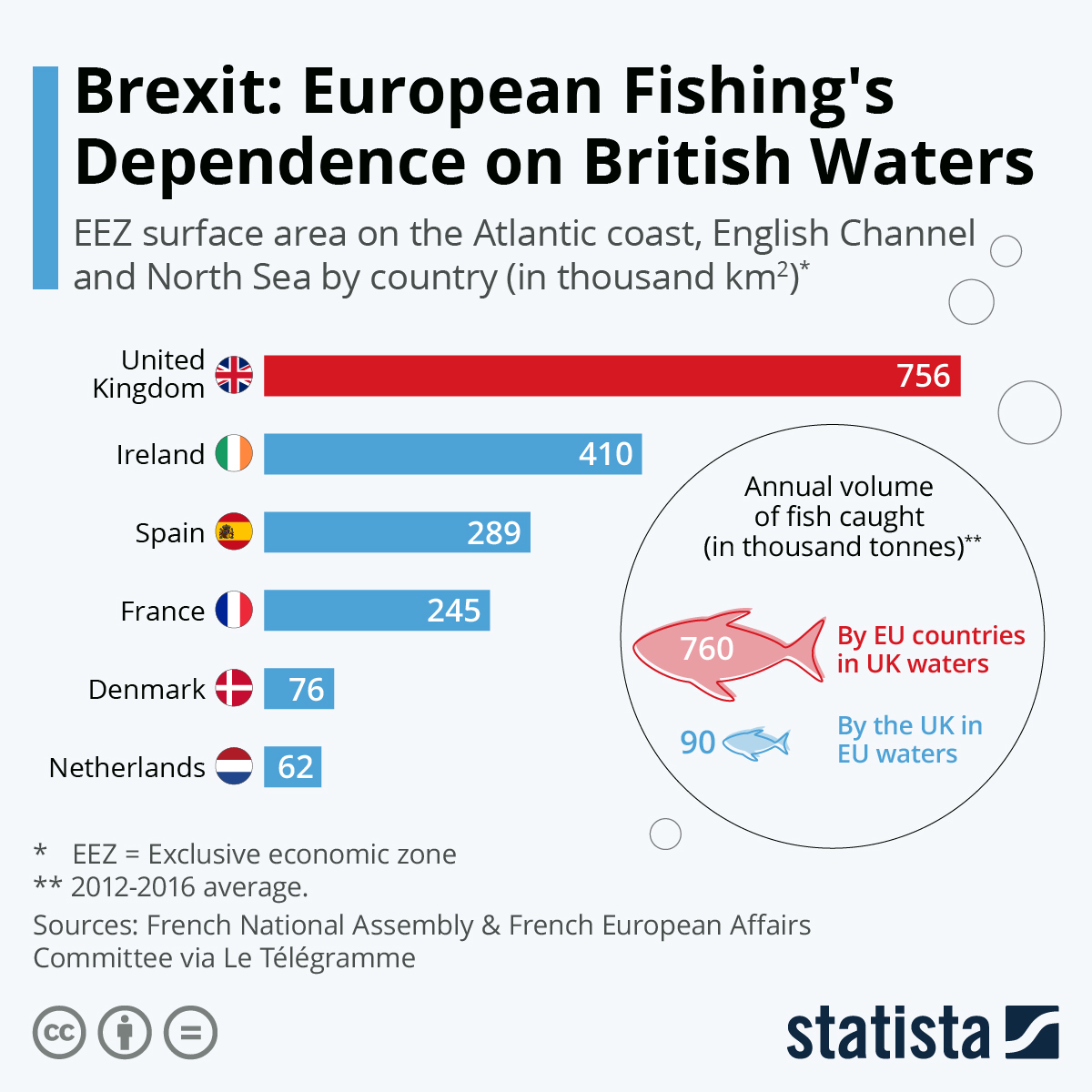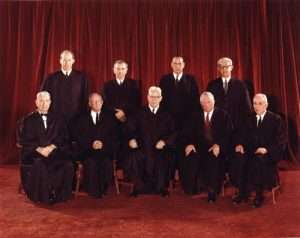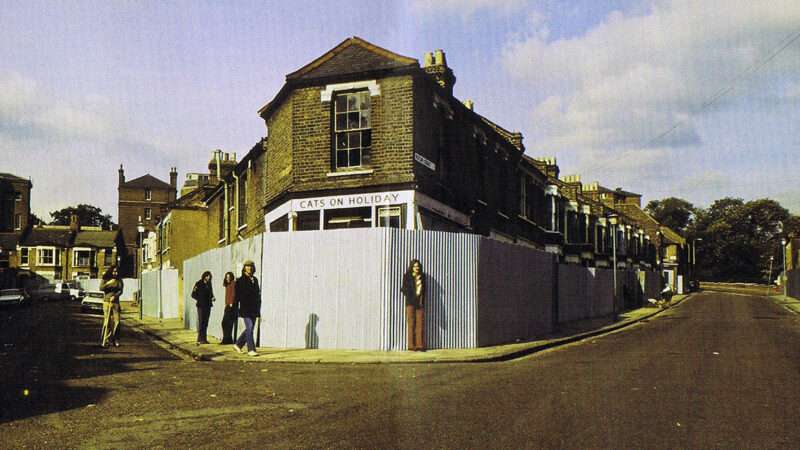“My gran used to live in Islington in this really nice old house, and they moved her to a block of flats, and she hasn’t got a bath now,” the rock star told the reporter. “She’s got a shower because there isn’t room for a bath. And like she’s 90 years old, she can’t even get out of the chair let alone stand in the shower. They haven’t taken that into consideration. And they knew she was going to move in because it’s a new block and they took her around and showed her where she was gonna live and she didn’t have any choice….The government people think they are taking them into a wonderful new world but it’s just destroying people.”
It was 1971. The Kinks had just released a new album, and the man who wrote and sang its songs was sitting down with Circus magazine to promote it. But explaining the L.P. apparently entailed talking about architecture. “It’s just very disturbing,” Ray Davies expounded, starting to sound like the Jane Jacobs of classic rock. “They’re knocking down all the places in Holloway and Islington and moving all the people off to housing projects in new towns. They say the houses they’re tearing down are old and decayed, but they’re not really.”
This wasn’t your ordinary rock-interview fare. But Muswell Hillbillies, which turns 50 on November 24, wasn’t an ordinary rock record. A concept album about the evils of urban renewal programs, it barely even gestured toward the pop mainstream, delving instead into country, blues, early jazz, and the British music-hall tradition. (On one track, the horn section reportedly played their instruments in a bathroom, the better to recapture the sound of an ancient recording session.) The songs’ topics weren’t your standard Top 40 fodder either, ranging from a Dixieland ditty about paranoid schizophrenia to an ode to the curative powers of tea. Small wonder that its sole single failed to crack Billboard‘s charts.
But some of us think it’s the best goddamn album ever made.
The sleeve art establishes the setting before the music even begins to play. On the front: the band enjoying some beers at an old-fashioned English pub, surrounded by drinkers old and young. On the inside: an iron fence surrounding a leftover wartime bomb site in the middle of the city. And then, when the music actually starts, you hear a song cycle about a community of particular people in a particular place, all trying to keep a grip on their lives in the shadow of the era’s enormous faceless institutions. Davies describes those characters with the same attentive detail that those planners failed to display when they gave a 90-year-old woman an apartment without a bathtub.
He sings about those planners too. In “Here Come the People in Grey,” the authorities prepare to rip down the narrator’s home: “The borough surveyor’s used compulsory purchase to acquire my domain/They’re gonna pull up the floors, they’re gonna knock down the walls, they’re gonna dig up the drains.” The singer has a reverie of resistance: “We’re gonna live in a tent, we’re gonna pay no more rent….We’re gonna buy me a gun to keep the policemen away.” But that’s just a daydream. “Some way, gonna beat those people in grey/But here come the people in grey to take me away.”
It’s a dystopian vision—but only to a point. There are cracks in this dystopia, little eruptions of color against the gray: eccentric neighbors, fussing relatives, familiar little traditions. The album’s title alludes to Muswell Hill, the North London suburb where Davies lived as a boy, and its verses are filled with references to people and places he knew growing up.
It also refers periodically to places he only imagined as he was growing up. As they lived their lives in Muswell Hill, these Londoners’ dreams kept drifting to America.
* * * * *
While Muswell Hillbillies was shipping to stores, America was listening to its own soundtrack. As the late 1960s melted into the early ’70s, the great culture-war anthem on this side of the Atlantic was Merle Haggard’s No. 1 country hit “Okie From Muskogee.”
First released in 1969, the same year Vice President Spiro Agnew called on the “silent majority to stand up for its rights,” the song seemed to draw a sharp line between Middle America and the counterculture. On one side, there was marijuana, LSD, draft card burners, swingers, long hair, hippies, San Francisco, beads, sandals, and campus rebels. On the other, there was chaste courtship, Old Glory, leather boots, football, respecting your elders, and maybe some moonshine when things got a little wild. The narrator put himself firmly in the second camp: “I’m proud to be an Okie from Muskogee/A place where even squares can have a ball.”
Some critics have argued that the song was intended as a joke. I’m inclined to understand it as a dramatic monologue: “Okie” reports how one of those Middle Americans feels about the cultural changes around him, and whether you react by nodding or laughing is up to you. But in 1971, almost everyone read “Okie” as an anti-hippie jeremiad. That’s certainly how Robert Palmer was invoking it in his New York Times review of The Kinks’ album. When he got to the L.P.’s closing track, a country-rock yawp called “Muswell Hillbilly,” Palmer declared that it “has the foot-stomping fervor of ‘Okie From Muskogee,’ but rather than aggravate existing conflicts, it stresses the unity of the disaffected young and society’s older victims in the face of an interlocking power structure bent on the destruction of human dignity and, eventually, human life.”
It’s a shrewd comparison, and not just because the songs share a shit-kicking spirit and some musical DNA. With “Muswell Hillbilly,” as with “Okie,” it’s best not to confuse the singer with the narrator. As you listen to it, ask yourself: Who’s telling this story?
The first verse sets the scene, sketching a character in a manner that’s both merciless and affectionate:
Well, I said good-bye to Rosie Rooke this morning
I’m gonna miss her bloodshot, alcoholic eyes
She wore her Sunday hat so she’d impress me
I’m gonna carry her memory til the day I die
That’s all we hear about the alcoholic in the Sunday hat. (Rosie Rooke was, apparently, a real person: a friend of Davies’ mother.) But in verse two, we learn a little more about the narrator:
They’ll move me up to Muswell Hill tomorrow
Photographs and souvenirs are all I’ve got
They’re gonna try and make me change my way of living
But they’ll never make me something that I’m not
Note the preposition: They’ll move him up to Muswell Hill. This isn’t a song about being pulled away from the community where Davies grew up. It’s about someone being resettled in that neighborhood, back before Davies was born.
Who’s telling this story? Not the man singing it. But it’s someone he knows. “My parents had grown up in Islington and Edmonston and had later moved out to the suburbs called Finchley, Highgate, Muswell Hill away from the inner city and the Victorian factories,” Davies wrote in 1994’s X-Ray: An Unauthorized Autobiography. “It must have been unrecognizable then.”
In the same paragraph, Davies said the song was about “a family similar to my own.” So maybe the narrator is one of his parents, or maybe it’s simply someone a lot like his parents. It doesn’t really matter which. It was not typical, in 1971, for a rocker to sing a verse from the POV of either his own parent or a parental stand-in, and it was even less typical for the parent to be the rebellious young star of the story. There’s more generational unity here than Palmer probably realized.
There is another song from the period that pulls off a trick like that. It was sung by a man from California whose parents had moved there, during the Depression, from Oklahoma. It’s written from the perspective of someone who is from Oklahoma, and the man who co-wrote and sang it has said it was inspired in part by people like his father—”proud people whose farms and homes were foreclosed by Eastern bankers. And who then got treated like dirt.” The song is “Okie From Muskogee.”
“Okie” still reflects a generation gap, or at least a culture gap; the narrator is full of complaints about hippies and student rebels. “Muswell” has none of that. As Palmer says, it damns a system that afflicts old and young alike. That system has already had a cameo in the song: It’s the “They” who are uprooting the narrator and plotting to change his way of living.
We’ll hear more about They in a bit. But first there’s a chorus, and the chorus turns everything upside-down:
‘Cause I’m a Muswell Hillbilly boy
But my heart lies in old West Virginia
Never seen New Orleans, Oklahoma, Tennessee
Still I dream of those Black Hills that I ain’t never seen
Wait. What?
This isn’t the United States that Haggard lived in and sang about. It’s an imaginary American vista, a landscape that an Englishman might visualize while listening to a Haggard record. Our narrator is dreaming of something he never experienced but feels like he faintly remembers, a past he thinks he recognizes in garbled images of America.
The album prepared us for this with another song, the haunting “Oklahoma U.S.A.,” about a woman who makes her neighborhood rounds lost in a Hollywood trance (“In her dreams she is far away/In Oklahoma, U.S.A./With Shirley Jones and Gordon McRea”). But the Muswell man’s daze draws on more than just a single movie—it’s a montage of fragmented impressions. West Virginia hillbillies, Oklahoma Okies, New Orleans jazzmen: together they seem to signify something old and authentic and free.
In fact, none of them (save those Black Hills) are as old as Muswell Hill, and the narrator is frank about how inauthentic his connection to them is. As for freedom: Davies was well aware that the sorts of bureaucrats that he decried in England had been tearing down homes in America too. He even recorded a song called “Mountain Woman,” left off the original album but eventually attached to a CD reissue as a bonus track, in which a pair of bona fide hillbillies—not the Muswell kind—lose their land to the U.S. government, which floods it, builds a hydroelectric power station, and moves the couple to “the thirty-third floor of a man-made concrete mountain.”
But in “Muswell Hillbilly,” Davies isn’t singing about the actual America across the ocean. He’s singing about a dream. Oppressed, he dreams of freedom; uprooted, he dreams of roots.
That dream makes him defiant:
They’re putting us in identical little boxes
No character, just uniformity
They’re trying to build a computerized community
But they’ll never make a zombie out of me
“They” are back in this verse, and their totalitarian intentions are becoming more clear. The narrator insists that They won’t succeed. And on reflection, we know he’s right, because we’ve been listening to a series of stories about the people of Muswell Hill, all persisting in their distinctive individuality.
The phrase “identical little boxes” calls to mind Malvina Reynolds’ “Little Boxes,” a rather smug song about suburban conformity (“little boxes made of ticky tacky…little boxes, all the same”). In 1960 and 1961, shortly before Reynolds wrote that song, the sociologist Herbert Gans interviewed dozens of people who had moved a few years earlier to a freshly built New Jersey suburb. He found more heterogeneity than the stereotypes of the time suggested; the town’s residents, he wrote in his 1967 book The Levittowners, “made internal and external alterations in their Levitt house to reduce sameness and to place a personal stamp on their property.” Character overcame uniformity, in Levittown and in Muswell Hill.
They’ll try and make me study elocution
Because they say my accent isn’t right
They can clear the slums as part of their solution
But they’re never gonna kill my Cockney pride
We’re back in Haggard territory here. “Listen to that line: ‘I’m proud to be an Okie from Muskogee,'” Haggard told Nat Hentoff in 1980. “Nobody had ever said that before in a song.” Okie pride and Cockney pride come together in the chorus, though the allusion to Oklahoma has been replaced by something else the second time around:
‘Cause I’m a Muswell Hillbilly boy
But my heart lies in old West Virginia
Though my hills are not green, I’ve seen them in my dreams
Take me back to those Black Hills that I ain’t never seen
On the album’s first track, Davies invoked the ghost of William Blake: “What has become of the green pleasant fields of Jerusalem?” And in the final stanza of the L.P.’s final song, we find ourselves in Blakean territory again, dreaming of green hills among these dark Satanic Mills. But now the paradise to be erected is not Jerusalem; it’s West Virginia and South Dakota. Kinks will not cease from mental fight, nor shall guitar sleep in their hands, til they have built America in England’s green and pleasant land.
* * * * *
The reference to Blake’s Jerusalem came in “20th Century Man,” a song where Davies declares: “I was born in a welfare state, ruled by bureaucracy/Controlled by civil servants and people dressed in grey/Got no privacy, got no liberty/’Cause the 20th century people took it all away from me.” Combine those lyrics, and you’re evoking Clement Attlee, prime minister from 1945 to 1951, who not only built the British welfare state but did so promising a “New Jerusalem.” And part of this New Jerusalem was the New Towns Act of 1946, which started the process of relocating Londoners from homes deemed substandard (or homes that had simply been bombed out) to planned communities outside the city limits.
That’s what Muswell was reacting against, but what was it for? Davies’ father voted for Attlee’s Labour Party, and Ray Davies found himself voting Labour too, even after he began growing disillusioned with the party. He even voted for it after it became New Labour and adopted what Davies derided as “a seamless blend of polite socialism meshed into conservative policies and a dreaded political correctness.” The party was “an outdated and somewhat ineffective force,” he explained in his 2013 book Americana, but the Tories didn’t have much appeal for him either, even if he “valued many traditional aspects of the past that are associated with conservatism.”

There’s a track on Muswell Hillbillies called “Uncle Son.” (The title again conjures the idea of old and young uniting, though it was apparently named for one of Davies’ actual uncles.) One of its verses recites a series of ideologies, then shifts gears and reminds the listener that some people don’t have that sort of ideology: “Liberals dream of equal rights/Conservatives live in a world gone by/Socialists preach of a promised land/But old Uncle Son was an ordinary man.” Change wasn’t worthwhile, the song suggested, unless it kept the Uncle Sons in mind. “Bless you, Uncle Son/They won’t forget you when the revolution comes.”
Muswell eschews grand visions: Its politics are rebellious, even revolutionary, but it doesn’t want a revolution that isn’t built on real families and neighborhoods, on actual individuals and their concrete freedoms and attachments. Otherwise you end up with an alleged New Jerusalem that exiles a woman from her comfortable old home and moves her to a flat where she can’t bathe.

from Latest – Reason.com https://ift.tt/31jh7X1
via IFTTT






